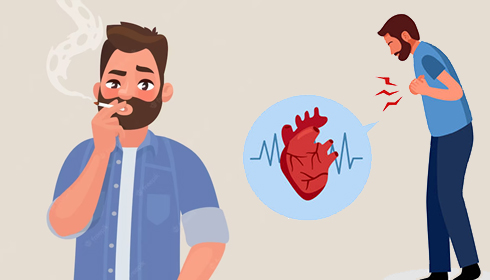
Cancer patients who continue smoking are at twice the risk of cardiovascular diseases than non smokers: Study
According to research published on World No Tobacco Day in the European Heart Journal, a journal of the European Society of Cardiology (ESC), cancer patients who continue to smoke after their diagnosis have a nearly doubled risk of heart attack, stroke, or death due to cardiovascular disease compared to non-smokers.
According to available data released by the World Health Organisation, there were more than 50.5 million cancer survivors worldwide in 2020.
“A cancer diagnosis is an extremely stressful life event, often leading to significant changes in a person's lifestyle. Smoking, in particular, is a health-related behaviour that can be heavily influenced by mental distress,” Study author Dr Hyeok-Hee Lee of Yonsei University College of Medicine, Seoul, Korea, said.
“However, little was known about the relationship between changes in smoking habits after a cancer diagnosis and the risk of cardiovascular disease, the leading cause of non-cancer-related death among cancer survivors,” Dr Lee added.
For their analysis, the researchers used data from a Korean national health claims database and included 309,095 cancer survivors who had never had a myocardial infarction or stroke.
Participants were examined both before and after their cancer diagnosis, and their smoking status was determined using a self-reported questionnaire.
Depending on their smoking habits after being diagnosed with cancer patients were separated into four groups, namely, non-smokers, quitters, initiators or relapsers, and continuous smokers.
The study found that about 10% of smokers quit smoking after a cancer diagnosis while 1.5% relapsed and 7.5% continued smoking even after being diagnosed with cancer.
Also Read:
| - Rusan Pharma launches campaign against tobacco consumption |
Interestingly, the research further found that the proportion of initiators or relapsers and continuing smokers combined was highest in survivors of urinary tract cancer and lowest among breast cancer survivors.
During a median of 5.5 years, the researchers analysed the risk of cardiovascular events, including myocardial infarction, stroke, or death related to cardiovascular disease for each group and compared with sustained non-smoking, the risk of cardiovascular events during follow-up was 86%, 51% and 20% higher among continuing smokers, initiators or relapsers and quitters, respectively.
The researchers found that their findings were consistent for women and men, and when the risk of myocardial infarction, stroke and cardiovascular death were analysed separately.
They also discovered that the benefits of stopping smoking outweighed the benefits of continuing to smoke.
57% of those who smoked before being diagnosed with cancer quit once they found out they had cancer.
Smoking cessation was associated with a 36% reduction in the risk of cardiovascular events when compared to continuing smoking.
Furthermore, the study found that approximately one in five patients who continued smoking reduced their daily tobacco consumption by at least 50% after receiving their cancer diagnosis.
The study further revealed that patients who continued to smoke but smoked less after finding they had cancer had the same risk of cardiovascular events as those who did not reduce their smoking.
“Some individuals may find solace in successfully reducing their smoking without completely quitting,” said Dr Lee.
“However, our results imply that smoking less should not be the ultimate goal and that smokers should quit altogether to gain the benefits of kicking the habit entirely," he added.
Pointing out that smoking initiation or relapse was associated with a 51% elevation in the risk of cardiovascular disease compared with sustained non-smoking. Dr Lee said, “Although our study does not provide conclusive evidence for the underlying causes of smoking initiation or relapse, some cancer survivors may lose motivation to have a healthy lifestyle after recovering, while others could turn to cigarettes as a way to cope with the stress of their diagnosis. These are only speculations, and further research is needed to determine factors associated with smoking initiation or relapse in cancer survivors.”
“Our results reinforce the existing evidence on the well-known cardiovascular risks of tobacco smoking and emphasise the benefits of smoking cessation, even for cancer survivors. Additionally, the finding that over 40% of patients who had been smoking before their cancer diagnosis continued to smoke afterwards highlights the need for more robust efforts to promote smoking cessation among cancer survivors, who already have an elevated risk of cardiovascular disease compared to their peers,” he concluded.